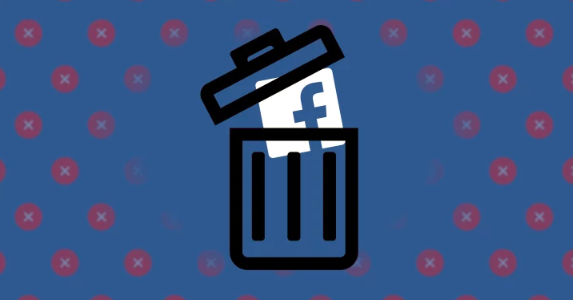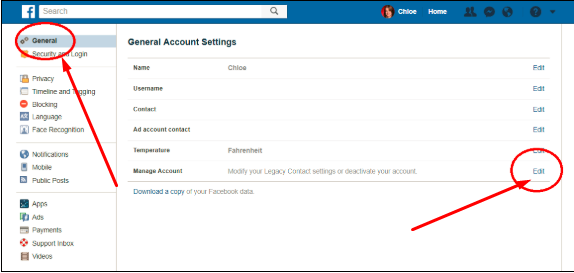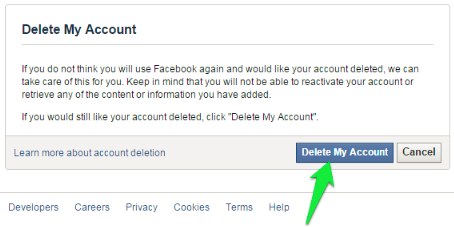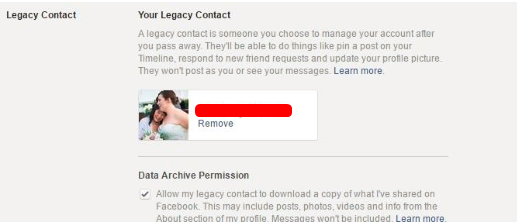Delete Your Facebook Account
By
Arif Rahman
—
Dec 2, 2018
—
Deleting Facebook Account
Current events could have you considering a break from Facebook. That's not a choice for everyone; because case, just tighten up your account settings. Delete Your Facebook Account: But if having your data mined for political objectives without your approval illustrations you out, there are means to liberate yourself from the enormous social network.
If you await a social media break, below's how to delete Facebook.
Delete Your Facebook Account
Deactivating
Facebook offers you 2 options: two choices: deactivate or remove
The initial couldn't be less complicated. On the desktop, click the drop-down menu at the top-right of your screen and also select settings. Click General on the leading left, Edit beside "Manage Account" Scroll down and also you'll see a "Deactivate My Account" web link near the bottom. (Right here's the direct link to use while logged in.).
If you get on your smart phone, such as utilizing Facebook for iOS, in a similar way go to settings > Account settings > General > Manage Account > Deactivate.
Facebook does not take this gently - it'll do whatever it could to keep you about, consisting of emotional blackmail concerning how much your friends will certainly miss you.
Thus, "Deactivation" is not the like leaving Facebook. Yes, your timeline will certainly vanish, you won't have access to the website or your account by means of mobile applications, friends cannot post or contact you, and also you'll shed access to all those third-party services that make use of (or need) Facebook for login. But Facebook does not delete the account. Why? So you could reactivate it later.
Simply in case that expected re-activation isn't in your future, you must download a copy of all your data on Facebook - posts, pictures, videos, chats, and so on-- from the settings menu (under "General"). Exactly what you locate might amaze you, as our Neil Rubenking found out.
Account Deletion
To fully delete your Facebook account forever and ever, go to the Erase My Account web page at https://www.facebook.com/help/delete_account. Simply understand that, per the Facebook data use policy "after you remove info from your account or delete your account, copies of that information could remain viewable somewhere else to the degree it has actually been shown others, it was or else dispersed pursuant to your personal privacy settings, or it was replicated or stored by various other users.".
Translation: if you composed a talk about a good friend's condition upgrade or photo, it will stay even after you delete your personal profile. A few of your posts and also photos might hang around for as long as 90 days after deletion, as well, though just on Facebook servers, not reside on the site.
Removal on Behalf of Others
If you want to alert Facebook concerning a user you understand is under 13, you could report the account, you narc. If Facebook can "reasonably validate" the account is used by somebody underage-- Facebook prohibits youngsters under 13 to adhere to federal legislation-- it will certainly delete the account quickly, without notifying any individual.
There's a separate kind to demand elimination of accounts for individuals who are clinically incapacitated as well as hence unable to use Facebook. For this to work, the requester must show they are the guardian of the person concerned (such as by power of attorney) as well as deal an official note from a physician or clinical center that define the incapacitation. Edit any information essential to maintain some personal privacy, such as clinical account numbers, addresses, etc.
If a customer has died, a legacy contact-- a Facebook friend or family member that was designated by the account proprietor before they passed away-- can get accessibility to that person's timeline, when accepted by Facebook. The tradition contact might have to supply a link to an obituary or other documents such as a fatality certificate. Facebook will "hallow" the web page so the deceased timeline survives (under control of the heritage contact, that cannot post as you), or if chosen, remove it.
Mark a details legacy call individual to handle your account after your passing away. You can discover that under settings > General > Manage Account > Your Legacy Contact. Once you set one up, you'll get a notification each year from Facebook to double check that the call should stay the exact same, unless you opt out of that. You could also take the additional action of making sure that after you pass away, if the legacy get in touch with does report you to Facebook as dead, your account gets erased (even if the legacy get in touch with wants the timeline to be memorialized).
If you await a social media break, below's how to delete Facebook.
Delete Your Facebook Account
Deactivating
Facebook offers you 2 options: two choices: deactivate or remove
The initial couldn't be less complicated. On the desktop, click the drop-down menu at the top-right of your screen and also select settings. Click General on the leading left, Edit beside "Manage Account" Scroll down and also you'll see a "Deactivate My Account" web link near the bottom. (Right here's the direct link to use while logged in.).
If you get on your smart phone, such as utilizing Facebook for iOS, in a similar way go to settings > Account settings > General > Manage Account > Deactivate.
Facebook does not take this gently - it'll do whatever it could to keep you about, consisting of emotional blackmail concerning how much your friends will certainly miss you.
Thus, "Deactivation" is not the like leaving Facebook. Yes, your timeline will certainly vanish, you won't have access to the website or your account by means of mobile applications, friends cannot post or contact you, and also you'll shed access to all those third-party services that make use of (or need) Facebook for login. But Facebook does not delete the account. Why? So you could reactivate it later.
Simply in case that expected re-activation isn't in your future, you must download a copy of all your data on Facebook - posts, pictures, videos, chats, and so on-- from the settings menu (under "General"). Exactly what you locate might amaze you, as our Neil Rubenking found out.
Account Deletion
To fully delete your Facebook account forever and ever, go to the Erase My Account web page at https://www.facebook.com/help/delete_account. Simply understand that, per the Facebook data use policy "after you remove info from your account or delete your account, copies of that information could remain viewable somewhere else to the degree it has actually been shown others, it was or else dispersed pursuant to your personal privacy settings, or it was replicated or stored by various other users.".
Translation: if you composed a talk about a good friend's condition upgrade or photo, it will stay even after you delete your personal profile. A few of your posts and also photos might hang around for as long as 90 days after deletion, as well, though just on Facebook servers, not reside on the site.
Removal on Behalf of Others
If you want to alert Facebook concerning a user you understand is under 13, you could report the account, you narc. If Facebook can "reasonably validate" the account is used by somebody underage-- Facebook prohibits youngsters under 13 to adhere to federal legislation-- it will certainly delete the account quickly, without notifying any individual.
There's a separate kind to demand elimination of accounts for individuals who are clinically incapacitated as well as hence unable to use Facebook. For this to work, the requester must show they are the guardian of the person concerned (such as by power of attorney) as well as deal an official note from a physician or clinical center that define the incapacitation. Edit any information essential to maintain some personal privacy, such as clinical account numbers, addresses, etc.
If a customer has died, a legacy contact-- a Facebook friend or family member that was designated by the account proprietor before they passed away-- can get accessibility to that person's timeline, when accepted by Facebook. The tradition contact might have to supply a link to an obituary or other documents such as a fatality certificate. Facebook will "hallow" the web page so the deceased timeline survives (under control of the heritage contact, that cannot post as you), or if chosen, remove it.
Mark a details legacy call individual to handle your account after your passing away. You can discover that under settings > General > Manage Account > Your Legacy Contact. Once you set one up, you'll get a notification each year from Facebook to double check that the call should stay the exact same, unless you opt out of that. You could also take the additional action of making sure that after you pass away, if the legacy get in touch with does report you to Facebook as dead, your account gets erased (even if the legacy get in touch with wants the timeline to be memorialized).








